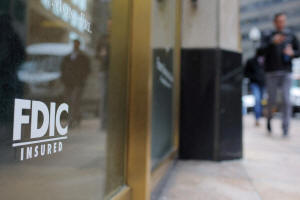Hardline US Republicans oppose bank deposit guarantees beyond $250,000
limit
 Send a link to a friend
Send a link to a friend
 [March 21, 2023]
By David Lawder [March 21, 2023]
By David Lawder
WASHINGTON (Reuters) - Hardline Republicans in the House of
Representatives on Monday vowed to oppose any universal federal
guarantee on bank deposits above the current $250,000 limit, throwing a
major roadblock to a key tool regulators could deploy if bank runs
re-emerge as financial confidence wobbles.
The Republican House Freedom Caucus said in a statement the Federal
Reserve "must unwind" its extraordinary funding facility created on
March 12 that allows banks to boost borrowing from the Federal Reserve
to cover deposit outflows.
"Any universal guarantee on all bank deposits, whether implicit or
explicit, enshrines a dangerous precedent that simply encourages future
irresponsible behavior to be paid for by those not involved who followed
the rules," the group said.
Some bankers and banking trade groups have asked for universal
guarantees from the Federal Deposit Insurance Corp (FDIC) to weather the
crisis touched off earlier this month by the failure of Silicon Valley
Bank. The upheaval has been marked by uninsured business depositors
fleeing smaller community and regional lenders toward the largest banks
perceived as "too big to fail."

The Mid-Size Banks Coalition of America said in a letter to U.S.
Treasury Secretary Janet Yellen and key regulators they should extend
FDIC insurance to all deposits for two years to "restore confidence
among depositors before another bank falls," echoing a similar step
taken during the financial crisis that erupted in 2008. The group is
identified as a political action committee by government transparency
group OpenSecrets.org.
Independent Community Bankers Association President Rebeca Romero Rainey
said in a statement that depositors in safely run small banks should get
the same guarantees that uninsured depositors in SVB and Signature Bank
received.
Such a move, also recommended last week by former FDIC chief Sheila
Bair, was done swiftly in 2008 but now requires approval by Congress in
a streamlined resolution process - a change put in place in the 2010
Dodd-Frank financial reform law.
U.S. officials were studying ways they might temporarily expand FDIC
coverage to all deposits, Bloomberg News reported on Monday, citing
people familiar with the matter.
[to top of second column]
|

A sign reads “FDIC Insured” on the door
of a branch of First Republic Bank in Boston, Massachusetts, U.S.,
March 13, 2023. REUTERS/Brian Snyder

APPROVAL DIFFICULTY
With at least 37 Freedom Caucus members in the closely divided but
Republican-controlled House of Representatives, the secretive group
of conservative Republicans could make passage difficult, especially
with tensions running high over a debt ceiling standoff with
Democrats.
Paul Kupiec, a former FDIC, International Monetary Fund and Fed
official, said the Fed's actions to provide liquidity were helping
to calm markets and bank customers, but pressures from a widening
interest rate mismatch between bank deposits and bonds and loans on
bank books would continue.
"My opinion is that this may be a lull," Kupiec, now a senior fellow
at the American Enterprise Institute, said of the relative calm on
Monday.
Runs could re-emerge if another bank falters, and if the institution
is large enough, regulators will again declare a systemic risk
exception and guarantee its uninsured deposits, he added.
U.S. officials acknowledge the volatility in the market, including
another big drop in First Republic Bank shares, but say the outflow
of deposits from many banks has stabilized or reversed - an
indication that the need for emergency action may be waning.
Following deposits of $30 billion by large banks into First Republic
last week, one U.S. official said discussions were continuing with
banks and other private sector actors who were "looking at ways to
provide both capital, deposits or looking at potential transactions
in the banking sector, because they have confidence in the
resilience of the banking sector."

"Given the stabilization in deposits and the fact that many
institutions have liquidity to meet the needs, their uninsured
depositors if they decided to leave, we feel better about where
things are now, but we're of course going to remain vigilant during
the next week," the official added.
(Reporting by David Lawder, additional reporting by Andrea Shalal;
Editing by Lincoln Feast.)
[© 2023 Thomson Reuters. All rights
reserved.]This material may not be published,
broadcast, rewritten or redistributed.
Thompson Reuters is solely responsible for this content. |